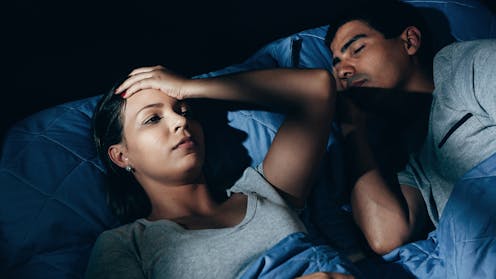Do women really need more sleep than men? A sleep psychologist explains
- Written by Amelia Scott, Honorary Affiliate and Clinical Psychologist at the Woolcock Institute of Medical Research, and Macquarie University Research Fellow, Macquarie University

If you spend any time in the wellness corners of TikTok or Instagram, you’ll see claims women need one to two hours more sleep than men.
But what does the research actually say? And how does this relate to what’s going on in real life?
As we’ll see, who gets to sleep, and for how long, is a complex mix of biology, psychology and societal expectations. It also depends on how you measure sleep.
What does the evidence say?
Researchers usually measure sleep in two ways:
by asking people how much they sleep (known as self-reporting). But people are surprisingly inaccurate at estimating how much sleep they get
-
using objective tools, such as research-grade, wearable sleep trackers or the gold-standard polysomnography, which records brain waves, breathing and movement while you sleep during a sleep study in a lab or clinic.
Looking at the objective data, well-conducted studies usually show women sleep about 20 minutes more than men.
One global study of nearly 70,000 people who wore wearable sleep trackers found a consistent, small difference between men and women across age groups. For example, the sleep difference between men and women aged 40–44 was about 23–29 minutes.
Another large study using polysomnography found women slept about 19 minutes longer than men. In this study, women also spent more time in deep sleep: about 23% of the night compared to about 14% for men. The study also found only men’s quality of sleep declined with age.
The key caveat to these findings is that our individual sleep needs vary considerably. Women may sleep slightly more on average, just as they are slightly shorter on average. But there is no one-size-fits-all sleep duration, just as there is no universal height.
Suggesting every woman needs 20 extra minutes (let alone two hours) misses the point. It’s the same as insisting all women should be shorter than all men.
Even though women tend to sleep a little longer and deeper, they consistently report poorer sleep quality. They’re also about 40% more likely to be diagnosed with insomnia.
This mismatch between lab findings and the real world is a well-known puzzle in sleep research, and there are many reasons for it.
For instance, many research studies don’t consider mental health problems, medications, alcohol use and hormonal fluctuations. This filters out the very factors that shape sleep in the real world.
This mismatch between the lab and the bedroom also reminds us sleep doesn’t happen in a vacuum. Women’s sleep is shaped by a complex mix of biological, psychological and social factors, and this complexity is hard to capture in individual studies.
Let’s start with biology
Sleep problems begin to diverge between the sexes around puberty. They spike again during pregnancy, after birth and during perimenopause.
Fluctuating levels of ovarian hormones, particularly oestrogen and progesterone, seem to explain some of these sex differences in sleep.
For example, many girls and women report poorer sleep during the premenstrual phase just before their periods, when oestrogen and progesterone begin to fall.
Perhaps the most well-documented hormonal influence on our sleep is the decline in oestrogen during perimenopause. This is linked to increased sleep disturbances, particularly waking at 3am and struggling to get back to sleep.
Some health conditions also play a part in women’s sleep health. Thyroid disorders and iron deficiency, for instance, are more common in women and are closely linked to fatigue and disrupted sleep.
How about psychology?
Women are at much higher risk of depression, anxiety and trauma-related disorders. These very often accompany sleep problems and fatigue. Cognitive patterns, such as worry and rumination, are also more common in women and known to affect sleep.
Women are also prescribed antidepressants more often than men, and these medications tend to affect sleep.
Society also plays a role
Caregiving and emotional labour still fall disproportionately on women. Government data released this year suggests Australian women perform an average nine more hours of unpaid care and work each week than men.
While many women manage to put enough time aside for sleep, their opportunities for daytime rest are often scarce. This puts a lot of pressure on sleep to deliver all the restoration women need.
In my work with patients, we often untangle the threads woven into their experience of fatigue. While poor sleep is the obvious culprit, fatigue can also signal something deeper, such as underlying health issues, emotional strain, or too-high expectations of themselves. Sleep is certainly part of the picture, but it’s rarely the whole story.
For instance, rates of iron deficiency (which we know is more common in women and linked to sleep problems) are also higher in the reproductive years. This is just as many women are raising children and grappling with the “juggle” and the “mental load”.
Women in perimenopause are often navigating full-time work, teenagers, ageing parents and 3am hot flashes. These women may have adequate or even high-quality sleep (according to objective measures), but that doesn’t mean they wake feeling restored.
Most existing research also ignores gender-diverse populations. This limits our understanding of how sleep is shaped not just by biology, but by things such as identity and social context.
So where does this leave us?
While women sleep longer and better in the lab, they face more barriers to feeling rested in everyday life.
So, do women need more sleep than men? On average, yes, a little. But more importantly, women need more support and opportunity to recharge and recover across the day, and at night.
Authors: Amelia Scott, Honorary Affiliate and Clinical Psychologist at the Woolcock Institute of Medical Research, and Macquarie University Research Fellow, Macquarie University



















